Month: November 2008
Hummer
Back from The Seagull and just waking up to Slumdog Millionaire winning big at the British Independent Film Awards, which ended five or six hours ago. Danny Boyle‘s film took the Best Picture and Best Director awards, and star Dev Patel was named Most Promising Newcomer. Steve McQueen‘s Hunger won three also — Best Debut Director award, Best Actor award for Michael Fassbender, and Best Technical Achievement for Sean Bobbitt‘s cinematography.
Tough Darts
Sports writer Pat Jordan‘s interview piece on Wrestler star Mickey Rourke in today’s N.Y. Times Magazine starts out fairly rough. In terms of his interview “performance”, he calls Rourke likable but clumsy, lost in his rap, emotionally insincere. In short Jordan isn’t buying the shpiel, which sets him apart from others who’ve written generally flattering profiles of Mickey-the-Comeback-Kid. A departure from the script.
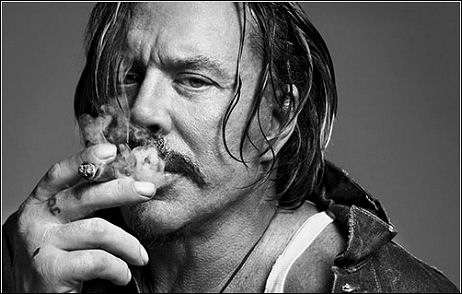
“You meet Mickey, you can’t help liking him,” Jordan begins. “He rescues abused dogs! He cries a lot: over his stepfather’s supposed abuse; the loss of his brother to cancer and his dogs to old age; the failure of his marriage to the actress Carre Otis. He admits he destroyed his own career, because, as he puts it: “I was arrogant…I wasn’t smart enough or educated enough” to deal with stardom.
“He is candid about the people he has crossed paths with: Nicole Kidman is “an ice cube”; Michael Cimino, the director of Heaven’s Gate, “is crazy” and “nuts”; and the producer Samuel Goldwyn Jr. is “a liar.”
“So what if he cries at the same moment in the same story in every interview? So what if his candor sometimes sounds like the bad dialogue from one of his many bad movies (“I have no one to go to to fix the broken pieces in myself”) or that his self-deprecation seems culled from the stock stories of so many fading actors (“I was in 7-Eleven, and this guy says, ‘Didn’t you used to be a movie star?'”)? So what if he seems disingenuous, at best, when he says he can’t remember that critics nominated him one of the world’s worst actors in 1991 (“I probably would have voted with them”) or even making a terrible movie that went straight to video, Exit in Red, in 1996 — despite the fact that the love interest in that movie was then his wife?
“Mickey Rourke is, after all, an actor. The roles he has played and the life he has lived have so blurred one into another in his mind’s eye that even he doesn’t seem to know when he’s acting or when he’s being real. He has spent his entire adult life playing not fictional characters but an idealized delusional fantasy of himself.”
I don’t know if this piece is going to do much for Rourke’s Best Actor chances. I suspect that the die is cast on Rourke being nominated (i.e., it’ll happen) and this or that article isn’t going to change things in this regard.
Soft Praise
“Sober intelligence goes only so far in crafting an effective bigscreen version of the international bestseller The Reader,” says Variety‘s Todd McCarthy. “German author Bernhard Schlink‘s succinct, widely admired 1995 novel uses a late-1950s affair between a former concentration camp guard (Kate Winslet) and a teenager half her age (David Kross) to explore both generations’ difficulty in coming to terms with German war guilt. Stephen Daldry‘s film is sensitively realized and dramatically absorbing, but comes across as an essentially cerebral experience without gut impact.”
Seagull Bound
It’s raining and cold — not quite cold enough for snow, but right on the edge — and I have to leave soon for a 3 pm performance of The Seagull. And I can’t find my umbrella. I’ve been waiting to see this for a long time, particularly from anticipation for Kristin Scott Thomas ‘s performance. I last saw The Seagull in the early ’80s with Chris Walken as Trigorin, who’s played in the current production by Peter Sarsgaard.
Carr’s Wrongos
In his debut column for the ’08-’09 Oscar-season, N.Y. Times guy David Carr – a.k.a., “the Bagger” — says that “seven or eight films have a shot” at the Best Picture Oscar. “The consensus, in no particular order — well, okay, in a little bit of a hierarchy — includes The Curious Case of Benjamin Button, Slumdog Millionaire, Frost/Nixon, Revolutionary Road, Milk Doubt and The Reader.”

Uhm, no. Not The Reader. Ixnay on the Eader-ray. (God, that sounds facile! Can you imagine pouring your heart and soul into a film for 18 months and then reading “ixnay on the Eader-ray”?) Sorry but that’s the verdict I’m hearing. Intelligent, well written, handsomely shot, doesn’t deliver emotionally.
“And a surprise may be waiting in the wings,” Carr goes on. “Clint Eastwood, a durable crush object of the Academy, has a habit of swinging out of the trees late in the game, as he did two years ago with Letters From Iwo Jima so keep an eye on Gran Torino.” The early rumble is that it’s more of a Clint performance film than a Best Picture contender, but sure, yeah, I’d love to keep an eye on Gran Torino . No Manhattan screenings are currently set, of course. (That I know of.) Tomorrow night there’s an L.A. press screening with a wine–cheese-and-Clint after-party.
“With almost three months to go, a great deal can happen,” says Carr. “The chemistry of Nicole Kidman and Hugh Jackman in Australia may bring to mind oil and water, but the Academy may swoon over the epic intent of the director, Baz Luhrmann (Moulin Rouge! and Romeo + Juliet).” Forget it. No way.
“The Walt Disney Company is carpet-bombing voters with DVDs to argue that the robotic glories of WALL*E should not be pigeonholed into animation alone.” That’s a no-go also. WALL*E‘s excellence has never been in question, but animated films need to stay on their side of the Rio Grande.
“And there’s always a chance that smaller films like Rachel Getting Married, with a searing performance by Anne Hathaway, or The Wrestler, featuring the muscular return of Mickey Rourke, might sneak in.” Nope. Rachel was written off weeks if not months ago.
And The Wrestler isn’t playing well with the over-50s. It’s a sharp and ballsy film, but when you hear about older people walking out of screenings because of the metal-staple scene and booing the mention of its name the following week, you might as well throw in the towel. Rourke is in good shape for a Best Actor nomination, though.
Slumdog Refresh
A Slumdog Millionaire issue has been gnawing away since I fell for it in Toronto nearly three months ago. I was wowed by this film — throttled. The injections of extreme verve and jolt-cola pizazz by director Danny Boyle are impossible to resist or dismiss. But I couldn’t believe in the world of the story, partly due to the fever-like sell going on all through it, and partly due to the undercarriage of the main character, Jamal (who’s mostly played by Dev Patel). And that’s a bit of a nag.

Talk to a Slumdog fan and they’ll probably tell you that the hyperness is part of the enjoyment — you don’t buy it but you love the intensity of the Bollywood-ish ride and particularly where it takes you at the conclusion. Slumdog is a show, but as much as it thrills and excites I feel that a truly formidable Best Picture contender needs to finally be unconcerned with the sell and confident enough to just “be.”
This isn’t to say that the presentation of Slumdog isn’t a kick-ass thing, or that the people who love it are somehow misguided in believing it has more Best Picture juice than any of the other hotties out there. LAFCA and NYFCC critics may or may not give it their Best Picture awards, but the Oscar rumble isn’t wrong. As things seem now, it will probably take the prize.
I’m still down with Slumdog for the most part. If it wins I won’t go into convulsions like I did when Chicago beat The Pianist. I love the life-force of it, the fusion of third-world squalor and the classic chops of Charles Dickens , the go-go swirl, the Boyle-ness of it. What other major director would have thought to make such a film in such a way?
It’s just that I couldn’t shake an awareness that every step of the way I was being subjected to a romantically simplistic blitzkreig — a steroid Dickens fable with a hero I very much liked and felt for but couldn’t finally accept.
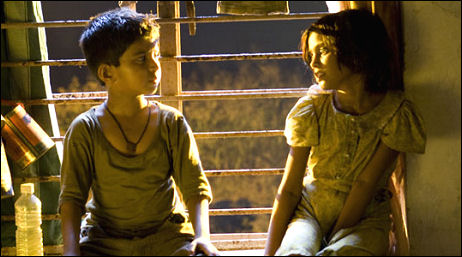
How can anyone watch Slumdog and not be down with Jamal’s enormous dignity, strength of spirit and intelligence? And I understand (or think that I do) that Jamal’s life story is primarily a device that allows Boyle to dramatize the evolution of Mumbai chaos-culture over the past 15 or 20 years.
But I just can’t believe that a kid who’s been subjected to such relentless cruelty and brutality his entire life — slapped, beaten, exploited, betrayed, booted, whipped, shat upon and made to suffer like a homeless dog day after day, year after year — would end up with this much patience and resolve and focus. Treat an actual dog like this and he’ll be incapable of showing anything but his canine teeth.
Nor did I believe that the beautiful Freida Pinto‘s Latika wouldn’t be soiled and corrupted by her upbringing also, or that she’d stay emotionally loyal to and in love with Jamal through thick and thin. Things change, people grow up and move on, life is hard, get what you can whenever you can, and nobody will save you but yourself. I know, I know…surrender to it, believe in love.
But the cruelty in this film is relentless. Ugly behavior reigns through the first two acts. Except for the cop (Irfan Khan) who interrogates Jamal throughout the film, nearly every male character in Slumdog Millionaire is a cutthroat Fagin or Artful Dodger. Snarling, feral, pitiless.
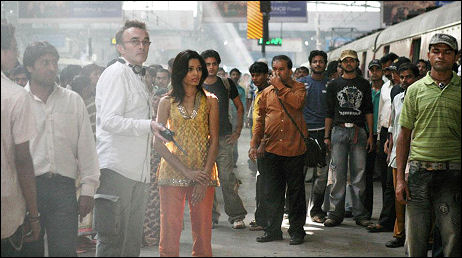
And all through Slumdog I was muttering to myself how much I hate the Mumbai overload — the poverty, the crowding, the noise, the garbage landscapes, the public outhouses, the ugly high rises…the whole squalid cornucopia of it. I’ve never been especially interested in visiting urban India, but Slumdog settled things once and for all. If someone slips me a first-class Air India ticket from JFK to Mumbai, I’m trading it in for passage to Vietnam or China or Kampuchea or Katmandu.
I was amused by what HE reader arturobandini2 said yesterday: “Don’t look for Slumdog to take top critics’ honors. But if SAG strikes, I predict it’ll be the Academy’s Best Picture winner. Mainly as a fuck-you gesture to actors from the rest of Hollywood.” Spot-on, love it. SAG members will deserve a hearty eff-you if they go on strike.
Slumdog may also triumph, he feels, “because it has a feel-exuberant finish, which the other contenders don’t have. The Academy fogies cream their Depends over that kind of ending, especially in a recession. I don’t particularly like the movie, but I witnessed the fever spreading in the theater like turbo-bacteria. The momentum seems undeniable.”
My deep-down suspicion after seeing Slumdog in Toronto, one that I kept to myself, was that the Academy bluehairs might back away somewhat because of the total absence of local talent. This doesn’t seem to have kicked in at all, however, and that in itself is very cool. In this spirit a Slumdog win could be seen as kindred to the election of Barack Obama. Black president, brown movie.
Shame
Shira Levine‘s Premiere riff about “10 Movies That Made Us Want To Smoke” was, for me, reckless and disgusting. What would the reaction be if someone wrote an article called “10 Junkie Movies That Made Us Want to Shoot Smack”? The piece is also, by my sights, inaccurate. Make that mystifying.
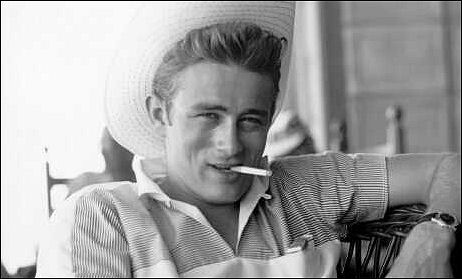
The only mention that hit home for me was her acknowledgement of Humphrey Bogart in Casablanca. Little-man Bogart was one of the three supreme hustlers of movie-smoking sex along with Robert Mitchum (in all those late ’40s and early ’50s noirs he starred in) and James Dean in Rebel Without a Cause . But she doesn’t mention the most essential element in successfully selling this delightful life-shortening habit to impressionable youths.
You have to smoke in movies like you don’t give a damn, like you don’t need it, like you don’t care one way or the other if you have any on you, like your Zen-ness is rooted in your soul and not in the way you look when you light up, you desperate asshole. Once an actor looks as if he anxiously wants or needs a smoke to stabilize or enhance his currency with an audience, he’s a dead man. Once an actor pulls out a cigarette in order to have something to do during a scene (and you can always spot actors who do this), the man has permanently surrendered his cool. He’s finished, discredited. And Levine doesn’t even mention this,.
I was profoundly unmoved, in any event, by Levine’s choices for strongest tobacco enticement — Coffee and Cigarettes, 200 Cigarettes, Wild at Heart, The Royal Tenenbaums, Kalifornia, Thank You For Smoking, Reality Bites and all the Madmen guys.
Make no mistake — nicotine is rank and putrid and Levine is pushing it like any R.J. Reynolds corporate scumbag. She’s attempting to sell the same cancer glamour journalistically that movies sold to her, and maybe pick up a Hollywood contact high on the side. In my mind she’s no better and less funny than Weasel J. Weisenheimer, the legendary R. Crumb dope pusher.
I’ve smoked on and off in my life. I truly hate it and particularly myself for succumbing from time to time, which has mainly happened when I’ve been in Europe, more particularly during my times at the Cannes Film Festival. There, I’ve admitted it.
Mumble in the Jungle
The Guardian‘s Simon Hattenstone is calling Benicio Del Toro “Hollywood’s finest mumbler since Marlon Brando. He is never better than when mumbling his lines. Except, possibly, when he has no lines to mumble at all. He loves nothing more than paring a script down to nothing. No one can grunt, wince or wheeze their way through a movie quite like Del Toro.
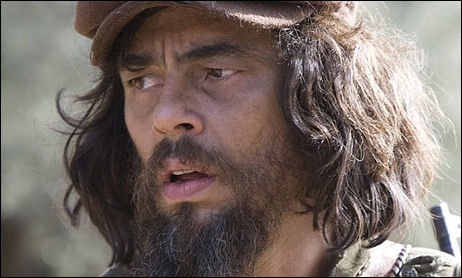
“Which makes his new film, Che, the perfect vehicle for him. In the movie, to be released in two parts (The Argentine and Guerrilla), Del Toro’s Che Guevara grunts through 253 minutes of action. This is a walking, rarely talking, gun-toting revolutionary wheeze machine. His performance makes Che in turn one of the most boring and most captivating films I have seen.” He doesn’t really mean “boring.” He just settled on that word as he punching the piece out. He trying to say “conventionally undramatic.”
“Politician, writer, traveller, biker, doctor, guerrilla and poster boy: few people have a more fascinating story than Guevara. But director Steven Soderbergh and Del Toro as good as refuse to tell it. There is hardly any narrative — we simply watch him hacking his way through the jungles of Cuba in part one and Bolivia in part two. It is a sublimely contrary piece of film-making. Only in the last minute does Soderbergh even attempt to humanize his protagonist as he reveals that he has left his four children at home.
“Hollywood trade paper Variety said Guerrilla had all the excitement of a military training documentary. And yet such is the physicality of Del Toro’s performance, the way he inhabits Guevara, that you can’t take your eyes off him.”
Will Slumdog Run The Table?
You’d never know it from their website, but I think/trust/have been told that the National Board of Review crew will decide their annual movie awards slate on Wednesday, 12.3 The LA Film Critics Association (LAFCA) site says they’ll announce their choices on Tuesday, 12.9. (Wait, don’t they usually vote on a Saturday? I was expecting them to vote on Saturday, 12.6.) And then the New York Film Critics Circle will vote on Wednesday, 12.10.
I’m rooting for a Revolutionary Road upset over Slumdog Millionaire from either LAFCA or NYFCC. Not because I’m against Danny Boyle‘s film in any way. I just think Sam Mendes‘ film needs a little advance traction to get rolling with the L.A. pueriles who are saying they don’t care for it because it’s too morose. I’m telling you, that Death of a Salesman play is such a downer — what a loser! And all those Shakespearean tragedies besides…God! Can’t we have a little hope and happiness in our lives, something to feel good about with the economy being the way it is?
I guess I can imagine Milk taking it in Los Angeles to symbolically refute the passage of Proposition 8. Maybe.

